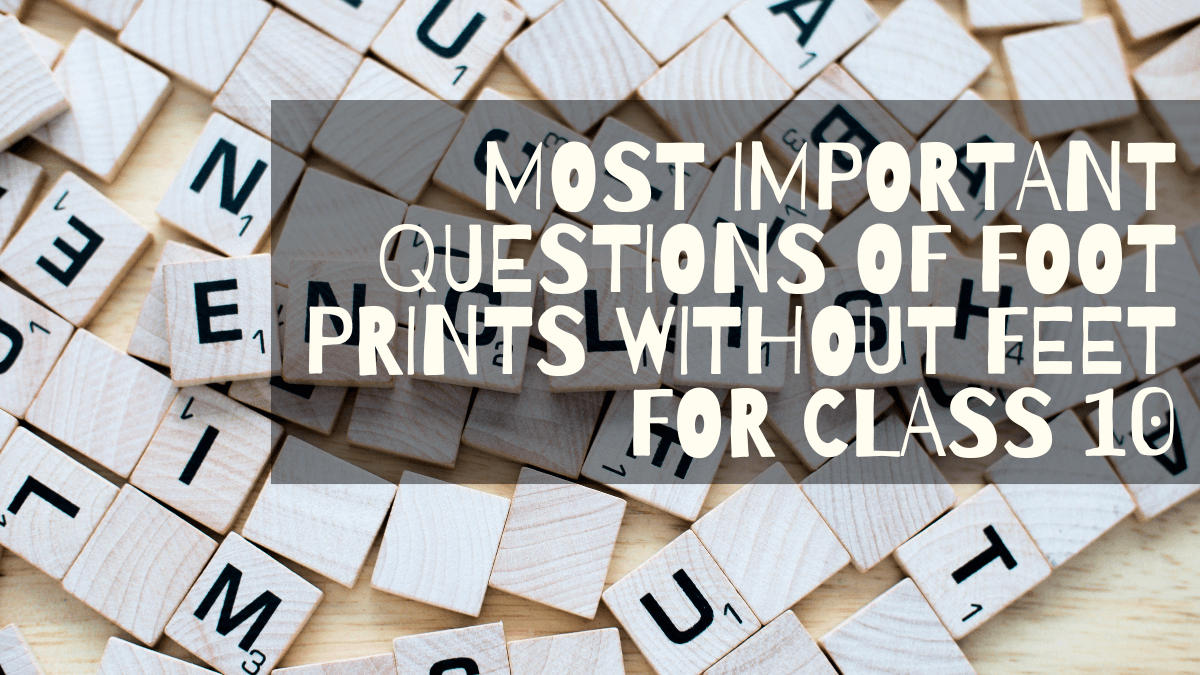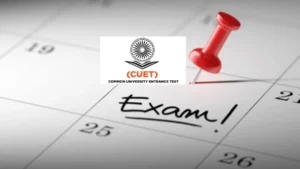Table of Contents
The Most Important Questions of Foot Prints Without Feet for Class 10 has been prepared by Adda247’s English subject matter experts. Students can read and learn from these questions and these are very important in their Class 10 examination 2025. The novella ‘A Triumph of Surgery‘ by James Herriot from the Class 10 English syllabus, the story tells the heartbreaking story of Tricki, a spoilt dog, and his wealthy mistress, Mrs. Pumphrey. Concerned about Tricki’s alarming weight gain and deteriorating health, Mr. Herriot, the veterinarian, determines that the only cure is to remove the dog for a while.
Students can rely on these important questions and answers from chapter taken from the chapter Footprints without Feet to get good marks in their Board English Exam. By understanding these questions, students will have better knowledge of the story.
Most Important Questions of Foot Prints Without Feet for Class 10
Most Important Questions of Foot Prints Without Feet for Class 10 are very helpful in understanding the chapter. The novel delves into topics of overindulgence, the value of adequate care, and the love between dogs and their owners. Herriot uses witty insights and a funny tone to show the transformational benefits of discipline and companionship on Tricki’s health, eventually leading to a wonderful recovery. Practice the questions and access more helpful questions anytime from our website.
Most Important Questions of Foot Prints Without Feet
Here we provide the FREE Class 10 English Important Questions for Foot Prints Without Feet for the Class 10 chapter with detailed solutions, created by expert teachers.
Practice Questions of Foot Prints Without Feet Chapter
Q1. Read the following extract carefully and answer the question given below.
“The entire staff was roused and maids rushed in and out bringing his day bed, his night bed, favourite cushions, toys, and rubber rings, breakfast bowl, lunch bowl, supper bowl. Realizing that my car would never hold all the stuff, I started to drive away. As I moved off, Mrs. Pumphrey, with a despairing cry, threw an armful of the little coats through the window.”
(i) What items did the maids bring for Tricki?
(a) Toys and cushions
(b) His beds, cushions, and bowls
(c) Only his day bed and bowls
(d) Rubber rings and coats
Sol. (b) His beds, cushions, and bowls
(ii) What did Mrs. Pumphrey throw through the window as the car was moving away?
(a) Tricki’s toys
(b) Tricki’s coats
(c) Tricki’s food
(d) Tricki’s bowls
Sol. (b) Tricki’s coats
(iii) How did Mr. Herriot react to the abundance of items?
(a) He was amused
(b) He was frustrated
(c) He ignored them
(d) He politely refused them
Sol. (a)He was amused
(iv) What emotion did Mrs. Pumphrey display as the car was leaving?
(a) Joy
(b) Despair
(c) Indifference
(d) Anger
Sol. (b) Despair
Q2. Read the following extract carefully and answer the question below.
“Ausable moved to an armchair and sat down heavily. The man standing opposite, named Max, was very nervous. Ausable said in a tired voice, ‘Sit down, Max. Why are you so nervous? You mustn’t be so jumpy if you’re going to stay in this business.’ Max remained standing, his eyes darting around the room.”
(i) How does Ausable’s voice indicate his mood?
(a) Ausable is excited.
(b) Ausable is indifferent.
(c) Ausable is tired and calm.
(d) Ausable is angry.
Sol. (c) Ausable’s tired voice suggests that he is calm and composed, showing no signs of excitement or anger.
(ii) What does Max’s behavior of remaining standing and his eyes darting around the room suggest?
(a) Max is confident and relaxed.
(b) Max is nervous and suspicious.
(c) Max is bored and uninterested.
(d) Max is deep in thought.
Sol. (b) Max’s behavior indicates that he is nervous and suspicious, as he cannot sit still and keeps scanning the room.
(iii) What advice does Ausable give to Max?
(a) To be more aggressive.
(b) To be more calm and composed.
(c) To run away quickly.
(d) To avoid being in the business.
Sol. (b) Ausable advises Max to be less nervous and jumpy if he intends to stay in the business, suggesting the importance of calmness.
(iv) What does Ausable’s heavy sitting down indicate about his physical state?
(a) He is weak and exhausted.
(b) He is energetic and lively.
(c) He is impatient.
(d) He is in a hurry.
Sol. (a) Ausable’s heavy sitting down indicates that he is weak or exhausted, showing physical tiredness.
Q3. Read the following Extract carefully and answer the question given below.
“As they gazed, a remarkable sight met their eyes. A fresh footmark appeared from nowhere! Further footprints followed, one after another, descending the steps and progressing down the street.”
(i) What did the boys see that amazed them?
(a) A man appearing from nowhere
(b) A dog walking alone
(c) Footprints appearing without a person
(d) A car moving by itself
Sol. (c) The boys were amazed to see footprints appearing without a person.
(ii) How did the footprints appear?
(a) Suddenly and without warning
(b) Gradually and faintly
(c) Only after rain
(d) As part of a pattern
Sol. (a) The footprints appeared suddenly and without warning.
(iii) What direction did the footprints take?
(a) They moved up the steps
(b) They disappeared in the air
(c) They descended the steps
(d) They stayed in one place
Sol. (c) The footprints descended the steps.
(iv) What was the boys’ reaction to the footprints?
(a) They followed the footprints
(b) They ran away in fear
(c) They called the police
(d) They ignored the footprints
Sol. (a) The boys decided to follow the footprints.
Q4. Read the following extract carefully and answer the questions given below.
“On her first day at school, Bholi sat in a corner, not knowing what to do. The other girls were reciting the alphabet. Bholi was nervous and scared. But the soft, kind words of her teacher made her feel comfortable. For the first time, she felt someone cared for her.”
(i) How did Bholi feel on her first day at school?
(a) Confident and excited
(b) Nervous and scared
(c) Angry and resentful
(d) Indifferent
Sol. (b) On her first day at school, Bholi was nervous and scared, unfamiliar with the new environment.
(ii) What were the other girls doing in the classroom?
(a) Playing games
(b) Talking loudly
(c) Reciting the alphabet
(d) Singing songs
Sol. (c) The other girls in the classroom were reciting the alphabet, showing their familiarity with the lessons.
(iii) How did Bholi’s teacher help her on the first day?
(a) By ignoring her
(b) By scolding her
(c) By speaking to her with soft, kind words
(d) By making her sit in the corner
Sol. (c) Bholi’s teacher helped her by speaking with soft, kind words, making her feel comfortable.
(iv) What was significant about Bholi’s experience with her teacher?
(a) It made her hate school
(b) It was the first time she felt someone cared for her
(c) It scared her even more
(d) It made her want to leave school
Sol. (b) Bholi’s experience with her teacher was significant as it was the first time she felt someone cared for her.
SHORT ANSWER QUESTIONS:
Q5. How did Madame Loisel react to the invitation to the ball?
Sol. Madame Loisel initially reacted with irritation to the invitation to the ball because she felt she had nothing suitable to wear. Despite her husband’s excitement, she was distressed by the thought of attending such an event without the appearance of wealth and elegance that she desired.
Q6. How did Bholi’s education empower her to make decisions about her life?
Sol. Bholi’s education empowered her by giving her confidence and the ability to think critically. It taught her to stand up for herself and not accept mistreatment. When faced with an undesirable marriage proposal, Bholi’s education gave her the courage to refuse and choose her own path.
Q7. How did Griffin use his invisibility to escape from the people chasing him?
Sol. Griffin used his invisibility to escape by removing all his clothes, which made him completely invisible. He then quietly slipped away, leaving no trace behind. His ability to disappear allowed him to evade capture and continue his activities without being detected by others.
Q8. What does the title “The Midnight Visitor” refer to in the story?
Sol. The title “The Midnight Visitor” refers to Max, who unexpectedly enters Ausable’s room late at night with the intention of stealing a secret report. His arrival sets the events of the story into motion.
Q9. How did the other dogs react to Tricki when he first arrived at the surgery?
Sol. The other dogs at the surgery were initially curious about Tricki but quickly lost interest in him because he was too lethargic to interact with them. They sniffed him and then ignored him.
Q10. How did Think-Tank view himself, and what impact did this have on his decisions?
Sol. Think-Tank viewed himself as the most intelligent being in the universe, which made him arrogant and overconfident. This inflated sense of superiority led him to underestimate Earthlings and make several flawed decisions, such as misunderstanding Earth’s books and calling off the invasion out of fear of Earth’s perceived intelligence.
Q11. What was the significance of Anil teaching the narrator to read and write?
Sol. The significance of Anil teaching the narrator to read and write lies in the opportunity it provided for the narrator to lead a better life. Education opened new avenues for the narrator, allowing him to escape a life of crime and aspire to honest work, thus transforming his character.
Q12. Why did Horace Danby suffer from hay fever, and how did it affect him?
Sol. Horace Danby suffered from hay fever during the summer, which caused him discomfort and frequent sneezing. This condition was a significant weakness that affected him physically and mentally, especially during his meticulously planned heists.
Q13. How did Griffin manage to escape from the assistants in the London store?
Sol. Griffin escaped from the store assistants by quickly undressing and becoming invisible again. As the assistants tried to catch him, he managed to slip out of their grasp because they couldn’t see him. His invisibility gave him the advantage needed to escape without being detected.
Q14. Why did Max believe Ausable’s story about the balcony?
Sol. Max believed Ausable’s story about the balcony because of Ausable’s convincing manner and detailed explanation. Max’s nervousness and urgency also made him more susceptible to believing the lie.
LONG ANSWER QUESTIONS
Q15. Discuss the significance of the title “A Triumph of Surgery.” How does it reflect the main theme of the story?
Sol. The title “A Triumph of Surgery” is significant as it encapsulates the central theme of the story, which is the successful intervention by Mr. Herriot to restore Tricki’s health. The word “triumph” suggests a victory or successful outcome, which in this case refers to the vet’s ability to reverse the damage caused by Mrs. Pumphrey’s overindulgence. The “surgery” in the title symbolizes the medical expertise and disciplined care that were necessary to save Tricki from his deteriorating condition. The title reflects the main theme of the story, which is the importance of professional intervention and responsible care in ensuring the health and well-being of pets. It also highlights the contrast between Mrs. Pumphrey’s misguided affection and Mr. Herriot’s effective treatment, underscoring the message that true care for pets involves a balance of love, discipline, and medical knowledge. The title, therefore, captures the essence of the story’s message about the triumph of professional care over indulgence.
Q16. Explain how the element of suspense is built up in “The Midnight Visitor.” What techniques does the author use to keep the reader engaged, and how does the climax resolve the tension?
Sol. Suspense is a key element in “The Midnight Visitor,” and the author builds it through a combination of setting, character interactions, and pacing. The story takes place in a small, dimly lit hotel room, which creates an atmosphere of confinement and tension. The sudden appearance of Max, a threatening figure with a gun, immediately raises the stakes and creates a sense of danger. The pacing of the story, with Ausable’s calm demeanor contrasted against Max’s nervousness, adds to the suspense as the reader is kept on edge, wondering how Ausable will handle the situation. The climax of the story, where Max attempts to escape through the non-existent balcony, resolves the tension in an unexpected and dramatic way. The resolution reveals Ausable’s cleverness and leaves the reader with a sense of satisfaction at how the situation is resolved.
Q17. How does the chapter “Footprints Without Feet” explore the theme of power and its consequences? Provide examples from the text.
Sol. The theme of power and its consequences is central to the chapter “Footprints Without Feet.” Griffin’s discovery of invisibility grants him extraordinary power, enabling him to move unseen and commit crimes without fear of being caught. This power, however, comes with significant consequences. Griffin’s ability to remain invisible isolates him from society, forcing him into a life of crime and loneliness. His misuse of power leads to a series of increasingly reckless actions, including theft and violence, which ultimately bring about his downfall. The story illustrates how the pursuit of power, without considering its ethical implications, can lead to destructive outcomes. Griffin’s inability to use his power responsibly serves as a warning about the dangers of seeking power for selfish reasons.
Q18. How does Bholi’s story challenge the traditional views of women’s roles in society? Discuss how the story promotes the idea of women’s empowerment.
Sol. Bholi’s story challenges traditional views of women’s roles in society by portraying a female character who refuses to accept the limitations imposed on her by societal norms. In a society where women were often valued based on their physical appearance and marriage prospects, Bholi’s decision to pursue education and reject an unfair marriage proposal is a powerful statement of empowerment. The story promotes the idea that women have the right to make their own decisions and should not be treated as mere objects of trade in marriage. Bholi’s journey from a simple, uneducated girl to a confident woman who stands up for her rights exemplifies the importance of education in empowering women to break free from societal constraints.
Q19. What role does education play in “The Thief’s Story,” and how does it influence the narrator’s decisions?
Sol. Education plays a crucial role in “The Thief’s Story,” serving as a catalyst for the narrator’s transformation. When Anil offers to teach the narrator how to read and write, it opens up new possibilities for him, giving him a glimpse of a future where he can earn an honest living. This educational opportunity becomes a turning point in the narrator’s life, as it makes him realize the value of knowledge and the potential for change. The ability to read and write symbolizes the narrator’s shift from a life of crime to one of personal growth and moral integrity. As the narrator learns, he begins to see himself as more than just a thief, which influences his decision to return the stolen money and embrace a more honest way of life. The story suggests that education is not just about academic knowledge but also about the development of character and the ability to make better life choices.
Q20. In what ways does the story “A Question of Trust” reflect on the nature of human weaknesses? Discuss with reference to the characters.
Sol. The story “A Question of Trust” reflects on the nature of human weaknesses through its characters, particularly Horace Danby. Despite his respectable image, Horace’s weakness lies in his uncontrollable passion for rare books, which drives him to commit theft. His belief that he can get away with his crimes because he is careful and plans meticulously is another weakness, rooted in overconfidence. The woman who deceives him also exhibits human weaknesses, such as greed and manipulation, using her charm and wit to exploit Horace’s trust. The story suggests that no matter how clever or careful a person thinks they are, human weaknesses can lead to their downfall. It highlights the idea that weaknesses, whether in the form of desires, overconfidence, or deceit are an intrinsic part of human nature, making individuals vulnerable to manipulation and betrayal.



 Bihar Board 12th Result 2025 Out @ inter...
Bihar Board 12th Result 2025 Out @ inter...
 NTA NEET Cut Off 2025, Expected Cutoff f...
NTA NEET Cut Off 2025, Expected Cutoff f...
 CUET UG Date Sheet 2025 @cuet.nta.nic.in...
CUET UG Date Sheet 2025 @cuet.nta.nic.in...

